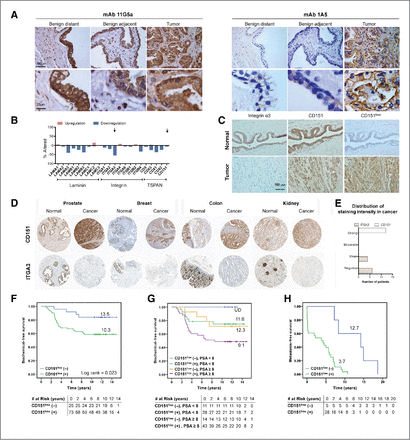Integrin-Free Tetraspanin CD151 Can Inhibit Tumor Cell Motility upon Clustering and Is a Clinical Indicator of Prostate Cancer Progression

Cancer Res. 2014 Jan 1;74(1):173-87. doi: 10.1158/0008-5472.CAN-13-0275. Epub 2013 Nov 12.
Palmer TD1, Martínez CH, Vasquez C, Hebron KE, Jones-Paris C, Arnold SA, Chan SM, Chalasani V, Gomez-Lemus JA, Williams AK, Chin JL, Giannico GA, Ketova T, Lewis JD, Zijlstra A.
Abstract
Normal physiology relies on the organization of transmembrane proteins by molecular scaffolds, such as tetraspanins. Oncogenesis frequently involves changes in their organization or expression. The tetraspanin CD151 is thought to contribute to cancer progression through direct interaction with the laminin-binding integrins α3β1 and α6β1. However, this interaction cannot explain the ability of CD151 to control migration in the absence of these integrins or on non-laminin substrates. We demonstrate that CD151 can regulate tumor cell migration without direct integrin binding and that integrin-free CD151 (CD151(free)) correlates clinically with tumor progression and metastasis. Clustering CD151(free) through its integrin-binding domain promotes accumulation in areas of cell-cell contact, leading to enhanced adhesion and inhibition of tumor cell motility in vitro and in vivo. CD151(free) clustering is a strong regulator of motility even in the absence of α3 expression but requires PKCα, suggesting that CD151 can control migration independent of its integrin associations. The histologic detection of CD151(free) in prostate cancer correlates with poor patient outcome. When CD151(free) is present, patients are more likely to recur after radical prostatectomy and progression to metastatic disease is accelerated. Multivariable analysis identifies CD151(free) as an independent predictor of survival. Moreover, the detection of CD151(free) can stratify survival among patients with elevated prostate-specific antigen levels. Cumulatively, these studies demonstrate that a subpopulation of CD151 exists on the surface of tumor cells that can regulate migration independent of its integrin partner. The clinical correlation of CD151(free) with prostate cancer progression suggests that it may contribute to the disease and predict cancer progression.

